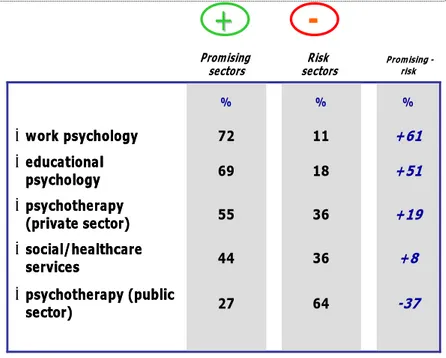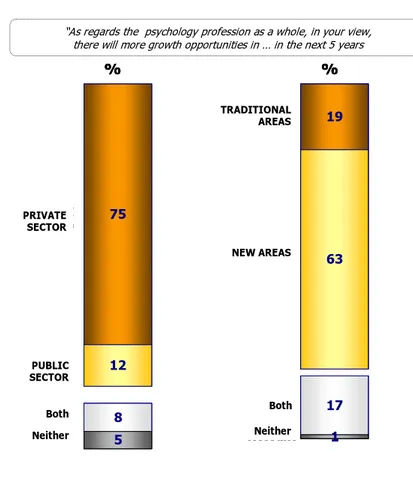Work and Organizational Psychology in Italy
and Siplo
(Italian Association of Work and Organizational Psychology)
role
Education regarding work and organizational psychology, along with the whole university education, has been – and still is - changing a lot, during the past ten years, with the aim of meeting the needs of today's national and European society. At this time, in Italy, education is organized into a first cycle (1st degree in psychology sciences – three years length), a second cycle (2nd degree in psychology sciences – two years length) and a PhD (three years length). To complete education, after the 2nd cycle (five years in total) a mandatory one-year training is foreseen, allowing access to the national qualifying test and following registration to the national Association of psychologists. Almost 15 universities in Italy offer a 1st and nd2 cycle in psychology sciences to train work and organizational psychologists. A PhD in organizational psychology is also offered (Verona University), as well as other specific courses in work and organizational psychology PhD within the more traditional psychology PhD, in 10 different universities (Bologna, Turin, Trento, Milan Cattolica, Milan Bicocca, Pavia, Florence, Chieti, Bari, Rome “La Sapienza”). All PhD in work and organizational psychology foresee a specialization that is highly research-oriented, with an international guidance, creating permanent cooperation with university research centres abroad and receiving foreign students (PhD in organizational psychology of University of Verona), patronizing joint supervision thesis with other European countries.
Academic research groups (with a very good relationship with organizations and institutions, too) promote traditional and innovative subjects, approaching researches both qualitatively and quantitatively, trying to keep the focus on the dialogue among the different theoretical approaches. Traditional research fields such as assessment and recruiting, training, stress, socialization and career are still gathering most attention by Italian researchers, while other fields are increasingly attracting scientific and professional interest. A special attention has recently been put on psychological well-being at work and its psycho-social risks, a subject especially promoted by recent Italian regulations, too. Studying new jobs and working methods has become topical, being them increasingly relevant aspects in an increasingly flexible society. Last, but not least, a special focus on innovation's psycho-social processes, a fundamental subject both in Europe and the rest of the world, scarcely studied by work and organizational psychology, if we compare it with technology and management.
Siplo (Italian Association of Work and Organizational Psychology) was founded in 1995 with the aim of promoting and developing WOP as a scientific and professional discipline.
The Association is a charter member of EAWOP and constantly cooperates with AIPTLF (Association Internationale de Psychologie du Travail et des Organisations) for which it organized, in Bologna in 2004, the XIII Work and Organizational Psychology Congress.
In 1997 SIPLO organized a first international seminary in Padova, inside the marvellous Palazzo del Bò, campus of one of the most ancient universities around the world (1222), focusing on future professional and research opportunities for work and organizational psychology in Italy and Europe, where several colleagues from Spain (José Maria Peirò), France (Claude Lemoine), Slovenia (Edvard Konrad) and Italy (Guido Sarchielli) have had the chance to discuss. This first seminary has been recorded in a monograph issue of Risorsa Uomo - Rivista di Psicologia del lavoro e
dell’organizzazione(a journal with articles in Italian, English and French). From then
on, work and organizational psychology in Italy and Europe has increasingly evolved both regarding research and education (only two degree courses were offered in Italy in 1985), while society itself has been increasingly asking psychology – and work psychology especially – to intervene.
Siplo has been organizing, since 1995 and every year, several activities at a national level, with the participation of work and organizational psychologists, mainly young professionals in their career's first years, and doctorate students. The association, in fact, sets itself up as a scientific and professional debating environment. It also organizes training activities (workshops and seminaries) for the development of specific skills for professional psychologists, such as recruiting, training planning, career evolution, assessment and skill building.
The Association has been carrying out activities, during the last few years, about expertise-building among young professionals, such as a best graduation thesis prize in the work and organizational psychology field, carried out inside the Psychology Department of the University of Bologna, a “showcase a talent” prize for the best research project and for the best professional project, the “telemaco” project (professional coaching) and theme-based groups promoting in-depth theoretical and practical examinations regarding various work methods.
During the last national annual seminary, Siplo has proposed a reflection on: “work is changing, so is work psychology”, discussing new working methods and the answers proposed by work psychology. University education (national and European, represented by Prof. José Maria Peirò) and professional practice have exchanged views on the subject. Dialogue between research and professional practice is the association activity's target (like other European and international associations), proposing meeting and cooperation moments and environments.
By Prof. Adalgisa Battistelli
(adalgisa.battistelli@univr.it
The state and prospects of Work and Organizational
Psychology in Italy
A survey was recently conducted (2008) on the state and prospects of the psychology professions in Italy with the support of the Consiglio Nazionale dell’Ordine (Italy’s professional body of psychologists). The survey was conducted using a structured questionnaire and based on telephone interviews (CATI). It involved a sample of 1500 respondents representative of the present population of practitioner psychologists in Italy in relation to the main socio-demographic parameters (sex, age, geographic distribution, membership of the register of psychotherapists). Regardless of the general results (discussed elsewhere), this article focuses on findings specifically concerning the Work and Organisational Psychology (WOP) profession.
1 The state of the profession. It can be estimated that, in Italy, approx 6% of all professional psychologists have chosen to work in “Work and Organisational” Psychology, while a further 6% work occasionally as consultants in this field. This is a sizeable minority of the professional community, and they number from 4,000 to 8,000 individuals in absolute figures (versus a total population of more than 70,000 practitioner psychologists). The activities performed by WOPs are fairly varied: occupations main relate to human resource management, training, organisational and services development, but they also include fields regarding communications, social and marketing research and performance appraisal. Professional satisfaction of WOPs is in line with that of other practitioner psychologists, while their salaries are greater (the highest in absolute terms, the average annual net income being 26,700 € vs. 17,800 € for Italian psychologists in general).
d Prospects for the profession. Expectations about the potential of WOP as a profession are particularly positive in Italy. The entire professional community generally agrees that WOP offers the greatest job opportunities in the near future (fig. 1).
Figure 1 – Opportunities for the profession: potential of job areas (base: practitioner psychologists, n=1168)
e
An opportunity/challenge for the profession. These opportunities for WOPs also constitute a challenge. The professional possibilities envisaged by respondents are in sharp divergence with the areas in which the psychology professions have grown most in recent years. Indeed, when asked to imagine the future of their profession, Italian psychologists consider these opportunities to be associated more with the private sector (and not the public sector as in the recent past) and with new areas (rather than the more traditional ones) (fig.2).-37 +8 +19 +51 +61 % 64 36 36 18 11 % 27 ¾psychotherapy (public sector) 44 ¾social/healthcare services 55 ¾psychotherapy (private sector) 72 ¾work psychology 69 ¾educational psychology % -37 +8 +19 +51 +61 % 64 36 36 18 11 % 27 ¾psychotherapy (public sector) 44 ¾social/healthcare services 55 ¾psychotherapy (private sector) 72 ¾work psychology 69 ¾educational psychology %
+
+
-Promising
sectors sectorsRisk
Δ
Promising -risk
“ In which areas, from the ones that I’m about to read, out do you see more job opportunities for psychologists in the near future? And in which areas do you think there will be more risks for psychologists?”
Figure 2 – Opportunities for the profession: growth prospects (base: practitioner psychologists, n=1168)
In short, psychologists are well aware of the future opportunities for WOPs in Italy, provided that they are able to successfully negotiate the new contexts. It is therefore crucial to adopt a proactive attitude to the profession so as to produce practitioners capable of integrating WOP knowledge/expertise with the new demands being made by society and the labour market.
By A. Claudio Bosio
Psychology Facult of the Catholic University of Milan. Milan, Italy
“Per quanto riguarda l’insieme delle professioni psicologiche, secondo Lei, nei prossimi 5 anni ci saranno più possibilità di sviluppo …
NEL SETTORE PRIVATO % NEL SETTORE PUBBLICO Entrambi Nessuno 75 12 8 5 % IN AMBITI CONSOLIDATI IN NUOVI AMBITI Entrambi Nessuno 19 63 17 1
“Per quanto riguarda l’insieme delle professioni psicologiche, secondo Lei, nei prossimi 5 anni ci saranno più possibilità di sviluppo …
NEL SETTORE PRIVATO % NEL SETTORE PUBBLICO Entrambi Nessuno 75 12 8 5 % IN AMBITI CONSOLIDATI IN NUOVI AMBITI Entrambi Nessuno 19 63 17 1 NEL SETTORE PRIVATO % NEL SETTORE PUBBLICO Entrambi Nessuno 75 12 8 5 % IN AMBITI CONSOLIDATI IN NUOVI AMBITI Entrambi Nessuno 19 63 17 1 % IN AMBITI CONSOLIDATI IN NUOVI AMBITI Entrambi Nessuno 19 63 17 1 PRIVATE SECTOR PUBLIC SECTOR Both Neither TRADITIONAL AREAS NEW AREAS Both Neither
“As regards the psychology profession as a whole, in your view, there will more growth opportunities in … in the next 5 years

